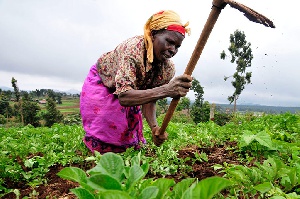- Home - News
- TWI News | TV
- Polls
- Year In Review
- News Archive
- Crime & Punishment
- Politics
- Regional
- Editorial
- Health
- Ghanaians Abroad
- Tabloid
- Africa
- Religion
- Election 2020
- Coronavirus
- News Videos | TV
- Photo Archives
- News Headlines
- Press Release
Business News of Thursday, 21 August 2014
Source: B&FT
Biotechnology investment key to agric dev’t
Agricultural scientists say it has become imperative for policymakers to uphold modern biotechnology with substantial research funding to empower it as a key rudiment to subdue the growing challenges confronting agricultural productivity in the country over the years.
According to the scientists, agriculture faces serious challenges: such as dwindling labour forces, low productivity, climate change, finite resources, rapid population growth, energy crisis, problems of global trade and inequalities, as well as excessive pressure on natural resources -- and therefore biotechnology remains the perfect antidote to make the sector competitive.
This came to light during a three-day training workshop held at Ejisu in the Ahanti Region for selected media practitioners from the Northern sector of the country. The workshop, organised by Programme Biosafety
Systems in collaboration with its partners, focused on agricultural journalism, biotechnology, biosafety, and genetically modified organisms (GMOs).
Dr. Hans Adu-Dapaah, Director CSIR-Crops Research Institute, said agricultural biotechnology applications reduce maturation time, increase nutrients-yield and ensure stress tolerance. He added that it also ensures environmental sustenance, and improves resistance to diseases, pests and herbicide.
He said though Ghana has over the years seen some level of biotechnology in agriculture, the country is yet to explore the full benefits and potentials of it [biotechnology]. Some completed works under the technology he mentioned include producing plantlets of banana, plantain, cassava, pineapple, ginger, shea-nut, cocoa, coco-yam, oil palm and coconut for mass propagation using the tissue-culture technique.
“The current farmland cover of Ghana is approximately 54.7% of its geographical area. Our population is about 25.28 million with an annual growth rate of 2.5%, which pegs Ghana’s projected population in the next 50 years at 51.7million. This calls for holistic and concerted efforts to mature our biotechnology from the embryonic stage and transform agriculture to meet the growing population, he observed.”
“There is need for more funding, skilled human resources, improving infrastructure, encouraging research & development, continuous training in universities, and intense private sector involvement in research.”
Prof. Walter Alhassan of International Service for the Acquisition of Agri-biotech Applications (ISAAA) Africentre said, by 2050, the world will require as much food as has been consumed since the beginning of civilisation. He noted that the population in Africa alone could increase from the current one billion to 3.6 billion by 2100 without the corresponding agric labour-force growth to feed the masses.
“About 65% of Africa’s labour workforce is employed by agriculture, but an issue such as aging farmers is affecting productivity. Declining farmer populations means it is the case that production will have to double/triple using fewer and diminishing resources. Powerful technologies such as agricultural biotechnology offer increased opportunities,” he said.
Prof. Alhassan indicated that agricultural biotechnology improves productivity and income, and protects biodiversity through sustainable intensification with less adverse environmental impact.











